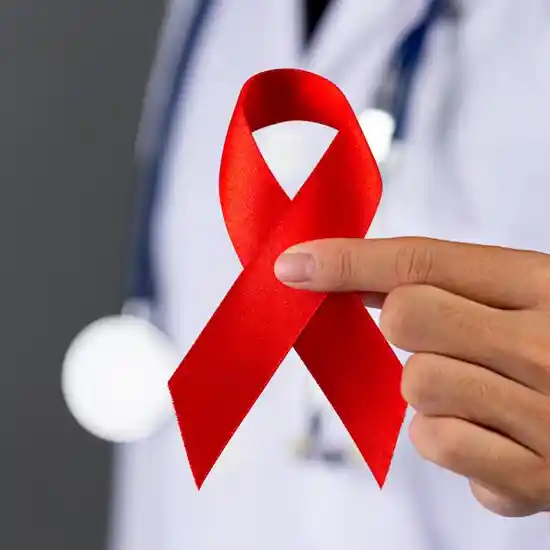
Book HIV Blood Test at Home Appointment Online Near me at the best price in Delhi/NCR from Ganesh Diagnostic. NABL & NABH Accredited Diagnostic centre and Pathology lab in Delhi offering a wide range of Radiology & Pathology tests. Get Free Ambulance & Free Home Sample collection. 24X7 Hour Open. Call Now at 011-47-444-444 to Book your HIV Blood Test at Home at 50% Discount.
HIV stands for Human Immunodeficiency Virus. This virus has 2 main types which cause infection in humans and further, several subtypes and strains.
Prolonged and untreated HIV infection can lead to AIDS, which stands for Acquired Immunodeficiency Syndrome.
AIDS is chronic and there is no cure for AIDS. AIDS is progressive and fatal too. However, treatment with certain drugs can prevent development of AIDS due to HIV infection.
There are 2 main types of HIV that cause infection in human population:
Among HIV 1, Group M is the most prevalent type and in HIV 2, Groups A and D are the most prevalent types.
The progression of HIV - 2 is slower as compared to HIV-1.
Symptoms of HIV infection depend on the stage of infection
Stage 1- Infection stage
This stage is also called as primary HIV infection. In this stage, the virus takes entry into the body and replicates rapidly.
The symptoms in this stage are acute flu-like symptoms such as the following:
Stage 2- Asymptomatic stage
This stage is also called as Clinical Latency Stage as there are no symptoms in this stage.
The virus in this stage continues to weaken the immune system of the infected individual without producing any symptoms.
HIV attacks CD4 cells and hamper immune responses of the host.
This stage lasts for about 8 years to 10 years on an average.
These people help in transmission of HIV to uninfected people as they are asymptomatic and don’t know that they have HIV infection.
Stage 3- Symptomatic stage
This stage is reached when the immune system is hampered to an extent where symptoms start showing in the individual.
Initially, the symptoms are mild but they worsen with time.
This stage also paves way for opportunistic infections, which worsen the condition. Examples of opportunistic infections: TB, Sarcoma, PCP, etc.
Stage 4 – AIDS
As mentioned earlier, prolonged and untreated HIV infection can lead to AIDS.
People who have AIDS are severely immune-compromised.
The complications arise due this immune-compromised state of the individual, due to which even minor infections become fatal.
HIV is transmitted through coming in contact with body fluids from an infected person, such as the following:
It is unlikely that HIV gets transmitted through droplets from sneezing or coughing.
HIV is not transmitted unless body fluids are exchanged between an infected and an uninfected person.
At Ganesh Diagnostic and Imaging Centre, the provision of home visit for blood test is free of any additional cost.
Procedure for blood home collection for HIV test
Blood test sample collection from home/ home visit for blood test sample collection
| Test Type | HIV Blood Test at Home |
| Includes | HIV Blood Test at Home (Home Sample Collection) |
| Preparation | |
| Reporting | Within 24 hours* |
| Test Price |
₹ 240
|

Early check ups are always better than delayed ones. Safety, precaution & care is depicted from the several health checkups. Here, we present simple & comprehensive health packages for any kind of testing to ensure the early prescribed treatment to safeguard your health.